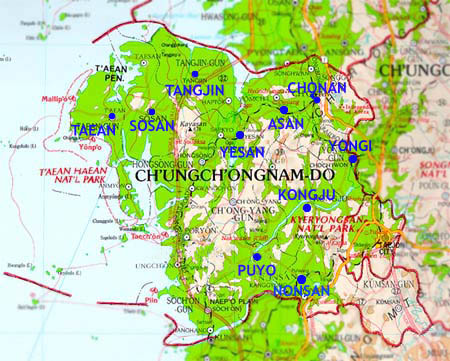Chungcheongnam-do – The “Capital of Welfare in Korea”

By Khatuna Chapichadze
Georgian Technical University
San Diego State University Professor
CHUNGCHEONGNAM-DO: As Yang Seung-jo, the governor of Chungcheongnam-do, South Chungcheong Province, welcomes the visitors of the place through the official website of The Province of Chungcheongnam-do, he states that Chungcheongnam-do is becoming the “Capital of Welfare in Korea” by successfully solving three crises: low birth rate, aging society and social polarization and revitalizing the economy.
According to the governor, “‘Chungnam, with a good environment for caring for children’, ‘Chungnam, where senior citizens are happy’, and ‘Chungnam, where all enjoy a happy life together’ are other names for Chungnam, the welfare capital of Korea. By progressively coping with the low birth rate, the increase of the aging population and the aggravated social and economic gap, Chungnam has been endeavoring to improve the quality of life of residents.”
As of the same source, “‘Chungnam, with a good environment for business’ underlies Chungnam, the welfare capital. Since 2006, Chungnam has been acting as the driving force for the rapid growth of Korea by achieving an average annual economic growth rate of 5.7%. Ranked second in export and top in the trade surplus in Korea in 2018, Chungcheongnam-do is filled with investment opportunities with a great business environment.”
The above-mentioned information and topics gain more significance in the wake of the new policy decisions announced by the South Korean government in December of 2020, regarding incentivizing nation’s families and encouraging more births amid one of the most dramatic falling figures for the country in the whole world.
Under the new policy, the government will provide 300,000 won ($275) as a bonus every month to all infants in the first year after their birth starting in 2022, while the monthly cash allowance will be gradually expanded to 500,000 won ($457) by 2025, according to Yonhap News Agency. According to officials, the new incentives and cash bonus are separate from the government’s earlier monthly allowance of 100,000 won ($91) for each child under the age of 7. Also, the government will dole out a 2 million-won ($1,827) cash bonus to expectant parents to help cover their prenatal expenses starting in 2022. The government also plans to increase the current 600,000-won ($550) congratulatory allowance for each pregnant woman to 1 million won ($916), while also including extra perks for working parents. Under the new package, couples with a child less than 12 months old can each receive up to 3 million won ($2,741) in monthly salary when both take a 3-month leave from work. The government will also provide university tuition fees to families in the low-income bracket with more than three children.
Despite the government efforts, the country’s total fertility rate, which refers to the average number of children a woman bears in her lifetime, hit an all-time low of 0.92 in 2019, down from 0.98 a year earlier, the agency reported. The Presidential Committee on Aging Society and Population Policy that prepared the new policy package, expected the figure to fall to 0.8 during the first half of 2021.
Majorly due to the lack of decent job opportunities, high home prices, and heavy private education fees, young South Koreans are opting to distance themselves from life’s three major milestones: dating, marriage, and having children.

























































